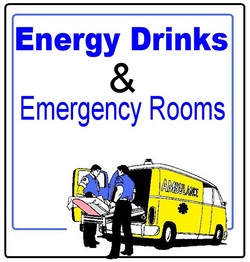
Energy drinks are made of water, sugar and high amounts of caffeine, ephedrine, guarana and ginseng. The most active of these ingredients is caffeine which can be between 3 and 20 times the amount found in soda. The combination and specific amounts of these ingredients differs between brands and serving sizes. Because sugar is one of the primary ingredients, excess sugar means excess calories. The sugar content and overall calories per serving are higher than soda and contribute to excess weight gain over time. Energy drinks are generally marketed as dietary supplements which are not regulated by the Food and Drug Administration. The additives in the energy drinks (ephedrine, guarana and ginseng) are also supplements and are not regulated by the FDA. Therefore, manufacturers do not have to list specific amounts of ingredients and do not have to follow food/beverage laws.These energy drinks affect many areas of your body, including the cardiovascular and nervous systems, and your sleep. Common side effects: nausea and vomiting, high blood pressure, tremors, dizziness and numbness. Overuse of energy drinks over time can cause serious heart and nervous system problems, including heart attack and seizures. Another danger is mixing energy drinks with alcohol. Those who do this generally feel alert enough to drive, yet are legally intoxicated.
But, the most concerning fact about these drinks is that in the past four years emergency room visits due to misuse has increased from 10,000 to 20,000. This new data, just released, is from the Substance Abuse and Mental Health Services Administration. Through their Drug Abuse Warning Network, they published an extensive report in the form of a pdf file here. Please take the time to look at the risks versus rewards and then make a decision to reconsider the use of these "magic" drinks...

 RSS Feed
RSS Feed
